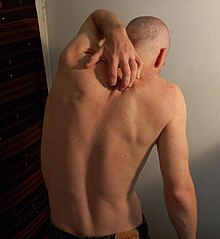User:Mr. Ibrahem/Itch
| Itch | |
|---|---|
| Other names | Pruritus, automatic tickle |
 | |
| A man scratching his back | |
| Specialty | Dermatology |
| Symptoms | Sensation that results in the desire to scratch[1] |
| Complications | Thickening of the affected skin from scratching, poor sleep[2] |
| Types | Localized, generalized[2] |
| Causes | Dry skin, eczema, cirrhosis, blood disorders, infections, reactions to medications, hyperthyroidism, kidney disease, cancer, psychosis, obsessive-compulsive disorder, substance use[2] |
| Treatment | Moisturizers, lower temperature environment, not scratching, avoiding irritants[2] |
| Medication | Corticosteroids, antihistamines, capsaicin[2] |
| Frequency | Relatively common[2] |
Itch, also known as pruritus, is a sensation that results in the desire to scratch.[1] Quality of life may be negatively affected.[2] A long term itch may result thickening of the affected skin from scratching, poor sleep, and tiredness.[2]
The common causes when much of the body is involved is dry skin and eczema.[2] A range of other conditions such as cirrhosis, blood disorders, infections, reactions to medications, hyperthyroidism, kidney disease, and cancer may also result in itchiness.[2] Itchiness may also be present in mental health disorders such as psychosis, obsessive-compulsive disorder, and substance use.[2]
Treatment should be directed at the underlying cause.[2] Basic measures that may help include moisturizers, a lower temperature environment, not scratching, and avoiding irritants.[2] Medications used may include corticosteroids, antihistamines, and capsaicin.[2] Itchiness is the most common skin related symptom.[2]
References[edit]
- ^ a b Andersen HH, Elberling J, Arendt-Nielsen L (September 2015). "Human surrogate models of histaminergic and non-histaminergic itch" (PDF). Acta Dermato-Venereologica. 95 (7): 771–7. doi:10.2340/00015555-2146. PMID 26015312.
- ^ a b c d e f g h i j k l m n o Nowak, DA; Yeung, J (December 2017). "Diagnosis and treatment of pruritus". Canadian family physician Medecin de famille canadien. 63 (12): 918–924. PMID 29237630.
